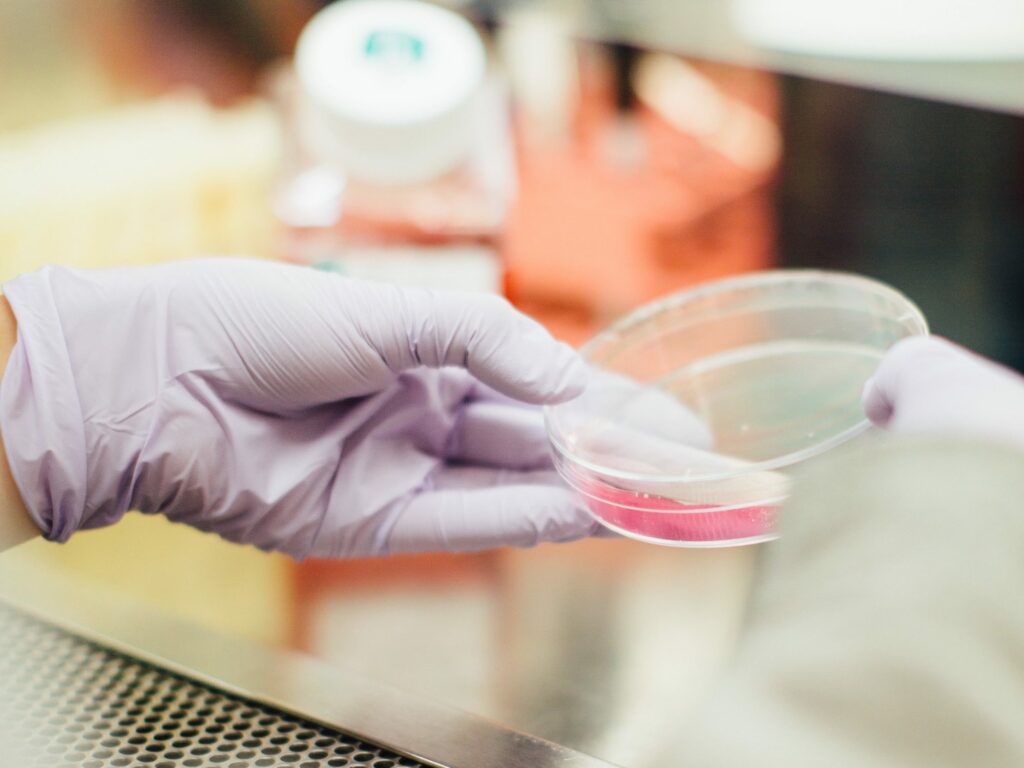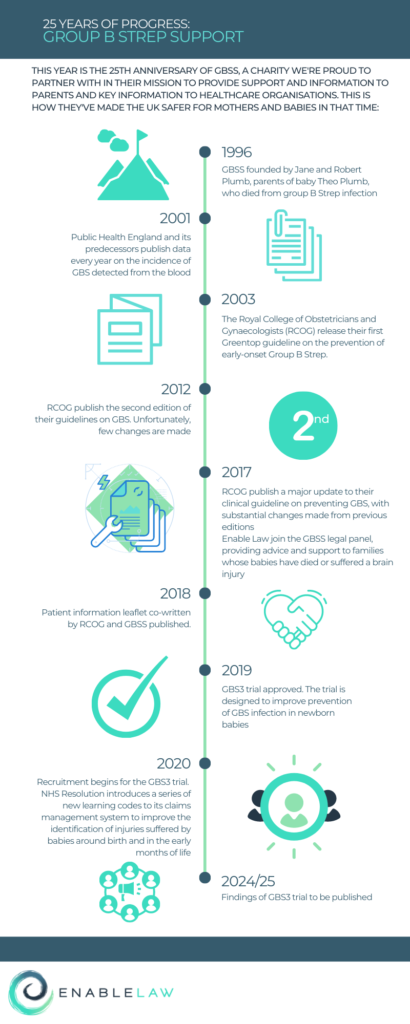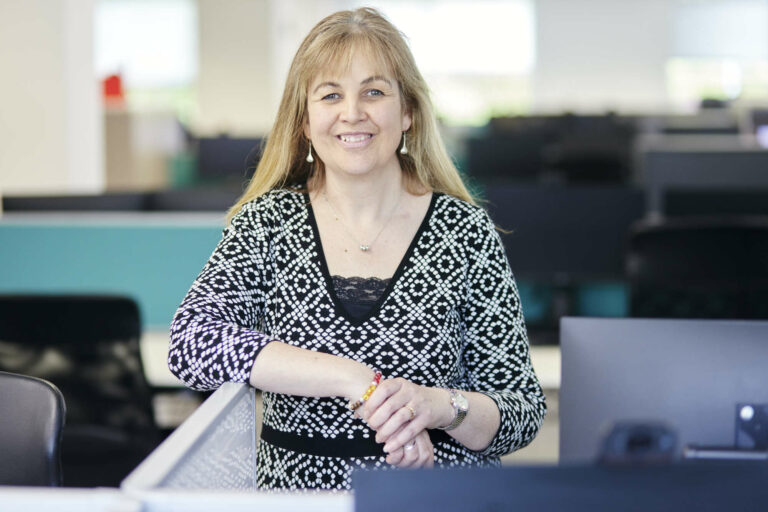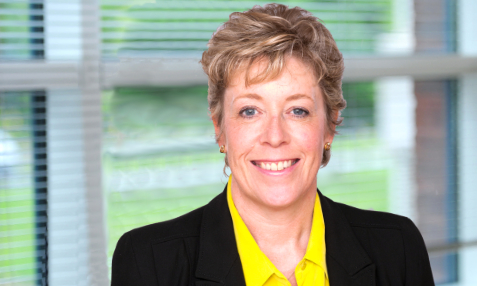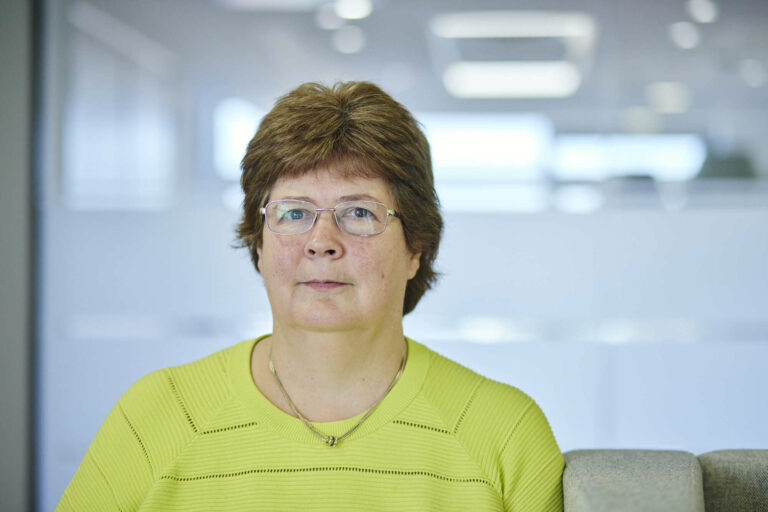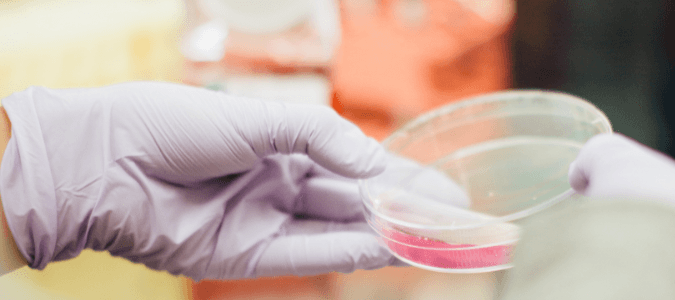
July is Group B Strep awareness month, an annual campaign by GBSS to highlight the importance of awareness, education and research. July 2021 is even more important as it marks GBSS’ 25th anniversary.
In more detail – The Timeline of Group B Streptococcus Support
- GBSS was founded in 1996 by Jane and Robert Plumb, parents of baby Theo Plumb, who died from group B Strep infection.
- Before GBSS was founded, there was no awareness for GBS, no guidelines and no source of good quality accessible information.
- There is now national guidance about GBS.
- From 2001 Public Health England and its predecessors published data every year on the incidence of GBS detected from the blood.
- In 2003 The Royal College of Obstetricians and Gynaecologists (RCOG) released their first Greentop guideline on the prevention of early-onset Group B Strep.
- In 2012, the RCOG published the second edition of their guidelines on GBS. Unfortunately few changes were made despite a lengthy consultation process to which GBSS and others contributed.
- In September 2017 RCOG published a major update to their clinical guideline on preventing GBS – their Green-top Guideline No 36. Substantial changes were made from previous editions. Enable Law also joined the GBSS legal panel, providing help and support to parents whose children whose babies have died or suffered a brain injury due to negligent medical care.
- In January 2018, a patient information leaflet co-written by RCOG and GBSS was published.
- In 2019, the GBS3 trial was approved. The trial is funded by the National Institute for Health Research and is a major clinical trial of routine testing for pregnant women for GBS in the UK. The trial is designed to improve prevention of GBS infection in newborn babies. The multi-million pound trial will involve 80 hospitals in England, Wales and Scotland. The findings will be reported in 2024/25.
- The trial will look at the effectiveness of two different tests – a test at 35 to 37 weeks of pregnancy where the samples will be sent to a local; laboratory, compared with a ‘bedside test’ at the start of labour. It is known that some women who test positive for group B Strep in pregnancy will not still be carrying the bacteria by the time they give birth.
- In 2020, recruitment began for the GBS3 trial. GBSS has been closely involved right from the start of the trial.
- In April 2020, NHS Resolution introduced a series of new learning codes to its claims management system to improve the identification of injuries suffered by babies around birth and in the early months of life. This included introducing a code specific to the treatment of GBS.
- The UK’s current approach to prevention of GBS is identifying pregnant women with ‘risk factors’ for their baby developing the infection, with testing for GBS either at 35-37 weeks of pregnancy or in labour.
Today, GBSS works in five main areas across the UK:
- Providing information and support to families affected by GBS
- Raising awareness of GBS among new and expectant parents
- Providing education services to health professionals so they are better able to prevent, spot and treat GBS infection in babies
- Providing a voice for all those affected by GBS infection by lobbying politicians and other influential bodies to change NHS and Government policy around GBS
- Supporting research into GBS, primarily through patient and public involvement
GBSS has a well-recognised highly reputable medical advisory panel made up of obstetricians, neonatologists, midwives and microbiologist. They ensure GBSS keep up-to-datefrom a medical perspective and review all information and documents produced to ensure GBSS are giving accurate and up-to-date medical information.
In the NHS GBSS is the number one source of information given to parents.
What has changed since GBSS was founded?
- More than 75% of pregnant women and new parents have heard of GBS
- Nearly half of all UK maternity units provide information on GBS to all pregnant women in their care
- GBSS provides good quality information both to concerned pregnant women, parents and to health professionals
Thanks to GBSS, the issue of improving GBS prevention remains on the agenda of national decision-making bodies, and children are alive and well today who otherwise wouldn’t be.
In the future, a GBS vaccine will be developed to prevent most GBS infection – both early and late-onset, as well as stillbirths and maternal infections, but this is still many years away. More needs to be done now to prevent GBS infections in newborn babies.
25th Anniversary
This year is GBSS’s 25th anniversary year and they are launching a new campaign, calling for:
- All women/expectant parents to be informed about GBS in the UK
- All healthcare professionals to be fully informed about GBS
- All hospitals in the UK to use the recommended GBS test
Sadly, many families only learn about GBS after their baby is seriously ill with meningitis, sepsis or pneumonia. The UK’s rate of GBS infection in infants is currently double that of other developed countries, many of whom have introduced routine antenatal screening for GBS.
A report published by GBSS in February 2021 found UK-wide failures to follow national guidelines on GBS:
- 51% of Trusts did not provide pregnant women with information on GBS
- 66% of Trusts used the wrong swab test to try and detect GBS
87% of Trusts used the wrong laboratory methodology to process the swab tests (Guidelines recommend that when testing for GBS, the GBS-specific Enriched Culture Medium (ECM) test should be used).
We are here to help
We are proud to support the work of GBSS through our corporate partnership, and we aim to make positive change to future care in every case and with every family we work with.
We act for a number of clients whose babies have either died or been severely brain injured due to GBS. Part of our work with them is to ensure they get the support and advice they need at such a devastating and difficult time in their lives. .
An increased awareness of Group B Strep, both by parents and by the medical profession, is vital and that is why we at Enable Law have supported the incredible work of GBSS for many years and continue to do so during its 25th year. You can read more about our work with GBSS on our dedicated Group B Streptococcus page or if you would like to discuss any aspects of your care please contact us.

